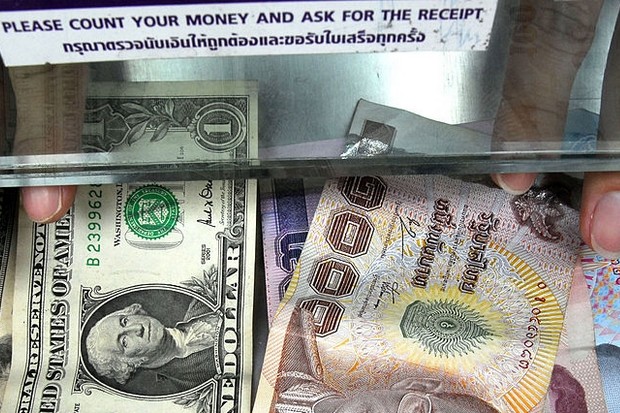
Views on the US dollar's prospects for the rest of the year are mixed, with Kasikornbank (KBank) forecasting that the baht will hit a one-and-a-half-year low of 34 to the greenback this quarter amid large-scale capital inflows.
The US Federal Reserve's more hawkish stance of signalling two more rate hikes this year and the tit-for-tat trade tariffs between the US and China will dampen Asian currencies, particularly the yuan, said Kobsidthi Silpachai, head of markets research.
With these factors and uncertainties, offshore funds will turn back to the US and lend support to the dollar, he said.
The bank earlier forecast this year's weakest baht level at 32.40 to the dollar, supported by dividend repatriation of multinational companies, but the trade spat between the economic behemoths has accelerated capital flight and prompted KBank to revise its projection.
Under US President Donald Trump's America First policy, the trade rift will intensify until the US midterm elections, to be held in November, Mr Kobsidthi said.
The trade row and Asia's currency retreats have taken a toll on Singapore's exports, down 5% in June, and the spillover effect could be seen in Thailand's merchandise shipments, but the effects will be spotted a few months behind Singapore, he said.
KBank is still maintaining its current projection for Thailand's export growth in a range of 8.8-9% this year.
Mr Kobsidthi predicted that the baht would reverse the downward trend in the final quarter, which is the country's high season for tourism.
The baht will appreciate to 33 to the dollar by year-end, he said, adding that the bank had earlier predicted the currency would be at 32 by that time.
Despite the downward trend of the yuan versus the greenback, the baht will hover around five per yuan, a level that will still encourage Chinese tourists to visit Thailand, he said. Chinese travellers account for Thailand's largest share of foreign visitors.
Thailand's robust economic growth and the improving momentum expected this half will also support the baht's strength, he said.
Mr Kobsidthi forecast that the US central bank will lift the policy rate once more for the rest of the year and that the faster pace of rate hikes could slow growth of the world's largest economy, weakening the dollar against other major currencies.
The European Central Bank's plan to end its bond purchase scheme at the end of the year could further pressure the greenback.
SCB Securities senior vice-president Isara Ordeedolchest said the baht is expected to depreciate further, as the US dollar is anticipated to appreciate on the back of rising inflation and economic growth in the US.
"Yields on US government bonds have started to increase and the trend is projected to continue, in line with an interest rate hike [by the US Federal Reserve], rising inflation, higher wage growth and low unemployment in the US," Mr Isara said. "This will cause Thai bond yields to rise accordingly."
Don Charnsupharindr, retail banking head at Citi Thailand, said the US dollar is expected to appreciate slightly in the short run, with the baht's value forecast between 32.50 and 32.80 against the greenback.
"Although the dollar has appreciated during this period, we expect such appreciation to be short-lived," Mr Don said. "For the medium and long terms, the dollar still has a tendency to depreciate because of the US government's tariff measures and its current account deficit."
The US's current account deficit, which measures the flow of goods, services and investment into and out of the country, widened by US$8 billion (266.8 billion baht) to $124.1 billion, or 2.5% of national economic output, in the first three months of the year, Reuters reported.
Elevated trade tensions from the US's trading partners also contribute to the weakening dollar outlook, Mr Don said.
Besides the China-US trade row, other factors expected to affect global investment sentiment include the US midterm elections, Brexit negotiations, Italy's domestic political turmoil, geopolitical tensions in the Korean Peninsula and political tensions in the Middle East, he said.
Despite forecasting higher financial volatility going forward, Citi Thailand still has a positive view on the equity asset class, especially Asia and emerging-market equities, as their valuation remains cheaper than those in developed markets, Mr Don said.
To manage volatility, he said investors will diversify into multi-asset classes and grab benefits from economic growth, particularly in Asian countries.
Investing in technology-related funds and equities associated with companies using artificial intelligence and robotics is also recommended, Mr Don said.
This year's global earnings per share among listed companies worldwide is expected to be above 13%.
Global economic growth is forecast to expand by 3.4% this year, with GDP growth in developed economies and emerging economies projected at 2.3% and 4.8%, respectively, Mr Don said.